Over the past few months we’ve heard a lot about contact tracers which are designed to inform users if they’ve potentially come into close proximity with someone who has the virus. Generally these systems have been based on smartphone applications, but there are also hardware solutions that can operate independently for those who are unable or unwilling to install the software. Which is precisely what [Tom Bensky] has implemented using an ESP32 and a USB battery bank.
The idea is simple: the software generates a unique ID which is broadcast out by the ESP32 over Bluetooth Low Energy. Appended to that ID is a code that indicates the person’s current physical condition. There’s no centralized database, each user is expected to update their device daily with any symptoms they may be experiencing. If your tracker is blinking, that means somebody has come in close enough proximity that you should look at the collected data and see how they were feeling at the time.

Another detail worth taking a look at is how [Tom] handled the user experience in his firmware. In an effort to make the tracer as easy as possible to configure, he’s using the Web Bluetooth capability of Google Chrome. Just open up the local web page in your browser, and it will handle talking to the hardware for you. Even if you’re not in the market for a contract tracer, we think this is a great example for how to handle end-user configuration on the ESP32.
We’ve already looked at contact tracer APIs from Google and Apple, dedicated COVID-19 hardware tokens, and even other open source attempts at decentralized proximity tracking. It’s a lot to process, and everyone seems to have their own idea on how it should be done. In the end, the most practical solution is probably to just stay at home as much as possible.


